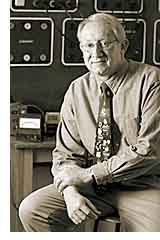


Engineering
Professor Asserts
Call to Excellence
 Rod
Heisler is a quiet yet passionate man in his late fifties, only slightly weathered
by 15 summers of salmon fishing in Alaska and his more than 30 years of teaching
in the Edward F. Cross School of Engineering.
Rod
Heisler is a quiet yet passionate man in his late fifties, only slightly weathered
by 15 summers of salmon fishing in Alaska and his more than 30 years of teaching
in the Edward F. Cross School of Engineering.
Heisler’s loyalties to Christian education run as deep as his commitment to excellence—qualities that have earned him the respect of his colleagues, as well as the distinction of 2000-2001 Distinguished Faculty Lecturer. This honor is awarded to a faculty member each year in recognition of their outstanding academic scholarship and outstanding service to the college. Heisler presented his lecture on campus in November.
“I owe everything I am to this church and its educational system. It’s a debt that I can never repay,” says Heisler.
After being selected, Heisler had a hard time settling on his topic. At first he considered focusing on evidences of the heart. That is, the idea that much of our evidence for God comes not from science, but from our emotional attachment to God. While that topic still intrigues him, he instead chose to challenge Christian education’s commitment to excellence.
For his topic, Heisler drew upon his experience as an academic dean, an engineering dean, and a teacher. As the college’s academic dean in the mid-80s, Heisler led curriculum development, budget preparation, academic policy, and faculty recruitment, among other responsibilities. That experience and perspective further charged his desire for academic excellence.
In his lecture, Heisler encouraged students and fellow faculty to do better by committing to scholarship through academic study and research. “We simply need to put more emphasis professionally on scholarship. The soul of a campus is scholarship. Our only reason for being as a college is scholarship. We always need to know what we believe and why we believe it,” says Heisler.
Heisler began his presentation by surmising about the possible causes of the perceived “dumbing down” of the educational experience. He asked if “dumbing down” could be the result of lost meanings for words critical to discriminating thought and behavior.
Words such as “discriminating” and “critical” are being maligned by the evolution of language. While one, he said, would not like to be known as discriminatory, neither would one like to be known as indiscriminate. Just as critical scholarship is necessary, he says, criticism is increasingly viewed in a negative light.
Much of this, Heisler feels, has to do with the phenomena of modern relativism‹the idea that “what’s true for you is not necessarily true for me, but that’s all right if it works for you.” Heisler feels that relativism is ripping the soul out of higher education.
“In most countries, higher education is an honor earned by hard work and good grades … I’m happy to live in a country where access to college education is an assumed right of all without regard to race, status, or religion. Unfortunately,” says Heisler, “many institutions have tacitly added to this list ‘without regard to ability or performance in secondary school.’”
Heisler asked if there had been a softening of requirements at WWC. He noted that last fall quarter “over half of the grades given by the faculty were A’s. Some departments awarded more than 75 percent A’s, while the least cooperative department in promoting grade inflation favored only 28 percent of its students with A’s.”
Scholarship, he said, is essential if students are to be taught by prepared teachers. At the lecture, Heisler presented an informal study delineating how professors at WWC use their 52-hour average workweek during the school year. “Roughly 75 percent of our time‹or 40 hours a week‹is spent on the direct aspects of teaching. Thirteen percent‹or seven hours a week‹goes to administrative tasks … Lastly, what is left over, or 10 percent, is applied to all forms of scholarship,” Heisler said. He further noted that the five hours of scholarship is skewed by the fact that the work of three “superstars” makes up for many fa- culty who reported no outside scholarship work.
Heisler challenged the faculty to place far more emphasis on scholarship and challenged WWC’s Board of Trustees “to staff this faculty with the best, and to provide the substance for them to support their families and to grow professionally as scholars.”
Heisler ended his lecture by returning to the idea of how to “discriminate” and “criticize.” “We had better not lose the capacity to discern between good and bad scholarship. We had better not lose the capacity to evaluate judiciously our own performance, and the work of our students … We don’t do that by giving cheap A’s or unwarranted accolades … I challenge us to be discerning about our responsibilities both to our students and to our professions.”